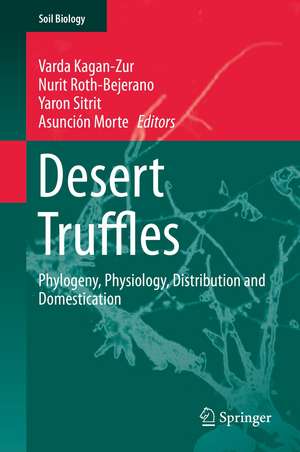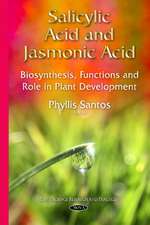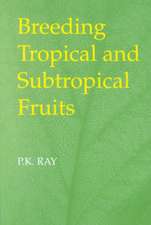Desert Truffles: Phylogeny, Physiology, Distribution and Domestication: Soil Biology, cartea 38
Editat de Varda Kagan-Zur, Nurit Roth-Bejerano, Yaron Sitrit, Asunción Morteen Limba Engleză Hardback – 18 noi 2013
This volume gives a comprehensive overview of the phylogeny, biology, mycorrhizal association, and distribution of desert truffles, their use, biochemical and medicinal properties, as well as their domestication and cultivation.
| Toate formatele și edițiile | Preț | Express |
|---|---|---|
| Paperback (1) | 949.73 lei 43-57 zile | |
| Springer Berlin, Heidelberg – 23 aug 2016 | 949.73 lei 43-57 zile | |
| Hardback (1) | 803.80 lei 38-44 zile | |
| Springer Berlin, Heidelberg – 18 noi 2013 | 803.80 lei 38-44 zile |
Din seria Soil Biology
- 18%
 Preț: 958.56 lei
Preț: 958.56 lei - 18%
 Preț: 1225.62 lei
Preț: 1225.62 lei - 18%
 Preț: 957.75 lei
Preț: 957.75 lei - 18%
 Preț: 1232.09 lei
Preț: 1232.09 lei - 18%
 Preț: 949.90 lei
Preț: 949.90 lei - 18%
 Preț: 1392.95 lei
Preț: 1392.95 lei - 18%
 Preț: 952.26 lei
Preț: 952.26 lei - 18%
 Preț: 1231.32 lei
Preț: 1231.32 lei - 18%
 Preț: 956.03 lei
Preț: 956.03 lei - 18%
 Preț: 948.29 lei
Preț: 948.29 lei - 18%
 Preț: 1224.18 lei
Preț: 1224.18 lei - 18%
 Preț: 1226.90 lei
Preț: 1226.90 lei - 18%
 Preț: 952.26 lei
Preț: 952.26 lei - 18%
 Preț: 942.63 lei
Preț: 942.63 lei - 18%
 Preț: 946.55 lei
Preț: 946.55 lei - 18%
 Preț: 1221.20 lei
Preț: 1221.20 lei - 18%
 Preț: 1225.94 lei
Preț: 1225.94 lei - 18%
 Preț: 946.24 lei
Preț: 946.24 lei - 24%
 Preț: 1051.27 lei
Preț: 1051.27 lei - 18%
 Preț: 1221.02 lei
Preț: 1221.02 lei - 18%
 Preț: 947.98 lei
Preț: 947.98 lei - 18%
 Preț: 948.47 lei
Preț: 948.47 lei - 18%
 Preț: 1222.31 lei
Preț: 1222.31 lei - 18%
 Preț: 1231.64 lei
Preț: 1231.64 lei - 18%
 Preț: 1225.31 lei
Preț: 1225.31 lei - 18%
 Preț: 1229.73 lei
Preț: 1229.73 lei
Preț: 803.80 lei
Preț vechi: 1057.62 lei
-24% Nou
Puncte Express: 1206
Preț estimativ în valută:
153.82€ • 159.62$ • 128.57£
153.82€ • 159.62$ • 128.57£
Carte tipărită la comandă
Livrare economică 12-18 martie
Preluare comenzi: 021 569.72.76
Specificații
ISBN-13: 9783642400957
ISBN-10: 3642400957
Pagini: 300
Ilustrații: IX, 397 p. 97 illus., 47 illus. in color.
Dimensiuni: 155 x 235 x 30 mm
Greutate: 0.74 kg
Ediția:2014
Editura: Springer Berlin, Heidelberg
Colecția Springer
Seria Soil Biology
Locul publicării:Berlin, Heidelberg, Germany
ISBN-10: 3642400957
Pagini: 300
Ilustrații: IX, 397 p. 97 illus., 47 illus. in color.
Dimensiuni: 155 x 235 x 30 mm
Greutate: 0.74 kg
Ediția:2014
Editura: Springer Berlin, Heidelberg
Colecția Springer
Seria Soil Biology
Locul publicării:Berlin, Heidelberg, Germany
Public țintă
ResearchCuprins
Hypogeous desert fungi.- Nomenclatural history and Genealogies of Desert Truffles.- Cryptic and new species.- Soil Properties.- Types of Mycorrhizal Association.- Pre-symbiotic interactions between the desert truffle Terfezia boudieri and its host plant Helianthemum sessiliflorum.- Benefits conferred on plants.- Ecology and Distribution of Desert Truffles in Western North America.- The European desert truffles.- Mediterranean Basin: North Africa.- Asian Mediterranean Desert Truffles.- Non mediterranean Asian desert countries.- Ecology and Distribution of Desert Truffles in the Kalahari of southern Africa.- Ecology and Distribution of Desert Truffles in the Australian Outback.- The History of Desert-Truffle Use.- Enzymes in Terfezia claveryi ascocarps.- Nutritional and antioxidant properties of Terfezia and Picoa.- Nutritional and antioxidant Properties of the white desert truffle Tirmania nivea (Zubaidi)..- Preservation of Truffles.- The Medicinal Value of Desert Truffles.- Domestication: Preparation of mycorrhizal seedlings.- Preparation and maintenance of both man-planted and wild plots.
Recenzii
From the reviews:
“This new book is very wide-ranging. … The editors are to be commended for bringing so many researchers together to produce such a wide-ranging and authoritative synthesis, which will surely be the key reference work in desert truffles, in the Mediterranean region particularly, for some decades.” (IMA Fungus, Vol. 4 (1), December, 2013)
“This new book is very wide-ranging. … The editors are to be commended for bringing so many researchers together to produce such a wide-ranging and authoritative synthesis, which will surely be the key reference work in desert truffles, in the Mediterranean region particularly, for some decades.” (IMA Fungus, Vol. 4 (1), December, 2013)
Textul de pe ultima copertă
Desert truffles are found in every known desert, irrespective of the habitat – cool or hot, loamy or acidic, sandy or heavy soil – the only common condition seems to be a limited supply of water. In contrast to ‘true’ truffles, desert truffles have evolved over time in different families, mainly within the order Pezizales. While in some arid areas, desert truffles have been traditionally used as food, in most regions interest has only recently been increasing, and truffles are now treasured for their nutritional value, as an income source and for research.
This volume gives a comprehensive overview of the phylogeny, biology, mycorrhizal association, and distribution of desert truffles, their use, biochemical and medicinal properties, as well as their domestication and cultivation.
This volume gives a comprehensive overview of the phylogeny, biology, mycorrhizal association, and distribution of desert truffles, their use, biochemical and medicinal properties, as well as their domestication and cultivation.
Caracteristici
Gives a modern approach of this new topic Integrates scientific and applied aspects With contributions by an international board of experts Includes supplementary material: sn.pub/extras






